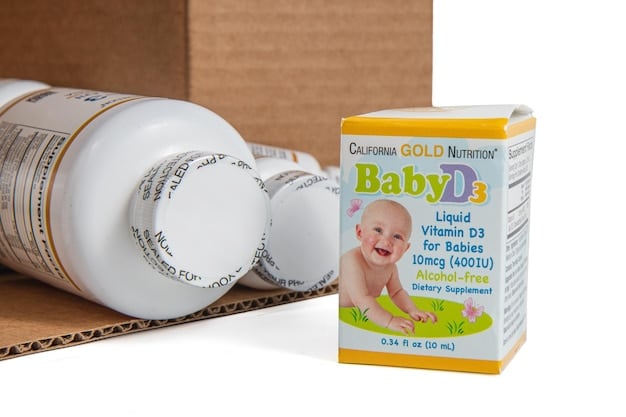Is Your Baby Getting Enough Vitamin D? 2025 Feeding Guidelines
Ensuring your baby gets enough vitamin D is crucial for bone development and overall health; updated 2025 feeding guidelines emphasize supplementation, especially for breastfed infants, to meet daily requirements and prevent deficiencies.
Navigating infant nutrition can feel overwhelming, especially when it comes to vitamins. Is Your Baby Getting Enough Vitamin D? Updated 2025 Feeding Guidelines offer clear recommendations to help ensure your little one thrives.
Understanding Vitamin D’s Importance for Babies
Vitamin D plays a vital role in your baby’s growth and development. It helps the body absorb calcium and phosphorus, which are essential for building strong bones and teeth. A deficiency can lead to serious health issues, making it crucial to understand how to meet your baby’s needs.
Why is Vitamin D So Important?
Vitamin D is important because it supports bone health, immune function, and overall growth in babies. Without adequate levels, babies are at risk of developing rickets, a condition that affects bone development.
The Risks of Vitamin D Deficiency
A Vitamin D deficiency can result in several health problems for infants, including weakened bones, delayed development, and increased susceptibility to infections. Recognizing these risks is crucial to ensure proper care.
- 🦴 Weakened bones and teeth
- 🤒 Increased risk of infections
- 🚶 Delayed motor development
- Growth stunting
Ensuring your baby gets enough vitamin D is a proactive step towards supporting their long-term health and well-being. By understanding its importance and the risks associated with deficiency, parents can make informed decisions about supplementation and dietary choices.
Updated 2025 Vitamin D Feeding Guidelines
The 2025 guidelines provide updated recommendations to ensure infants receive adequate vitamin D. These guidelines take into account the latest research and aim to provide clear, actionable advice.
Key Changes in the 2025 Guidelines
The updated guidelines emphasize the need for supplementation from birth, especially for breastfed babies. They also clarify dosage recommendations and address concerns about potential risks.
Recommended Daily Intake
The recommended daily intake of vitamin D for babies is 400 IU (international units). This amount helps ensure optimal bone health and immune function. It’s important to follow this guideline to prevent deficiencies.

- 👶 400 IU daily from birth
- 🥛 Supplementation is crucial for breastfed infants
- ☀️ Limited sun exposure requires supplementation
- 🧐 Consult with your pediatrician for personalized advice
These updated guidelines underline the necessity of consistent vitamin D supplementation for infants, especially if they are breastfed. By following these recommendations, parents can help their babies achieve and maintain optimal health.
Vitamin D Sources: What Works Best for Babies?
While sunlight is a natural source of vitamin D, it’s not always a reliable option for babies. Supplementation and certain foods can help bridge the gap and ensure your baby gets enough of this essential nutrient.
Sunlight Exposure: Is It Enough?
Sunlight is a natural way for the body to produce vitamin D, but it’s not reliable for infants. Factors like skin pigmentation, time of day, and geographic location affect how much vitamin D a baby can synthesize from the sun.
Vitamin D Supplements: A Reliable Option
Vitamin D supplements are a safe and reliable way to meet your baby’s daily needs. These drops are easy to administer and ensure consistent dosage, making them a practical choice for supplementation.
For breastfed babies, supplementation is especially crucial, as breast milk alone may not provide enough vitamin D. Formula-fed babies typically receive vitamin D through fortified formula, but supplementation might still be necessary depending on how much formula they consume and individual recommendations from the pediatrician.
Vitamin D supplements, especially in the form of easy-to-administer drops, are a reliable and efficient way to safeguard your baby’s health, ensuring they receive the necessary vitamin D regardless of sunlight exposure or dietary habits.
How to Choose the Right Vitamin D Supplement
When selecting a vitamin D supplement for your baby, it’s important to choose a product that is specifically designed for infants. Look for options that are free of additives, easy to administer, and have been tested for safety and quality.
What to Look for on the Label
Check the label for the correct dosage (400 IU), as well as any potential allergens or additives. Opt for a supplement that is free of artificial colors, flavors, and preservatives.
Dosage and Administration Tips
Follow the dosage instructions carefully and administer the drops directly into your baby’s mouth or mix them with a small amount of breast milk or formula. Ensure you are using the dropper correctly to avoid over or under-dosing.

- ✅ Opt for supplements designed for infants
- 🧐 Check the label for potential allergens
- 💧 Follow dosage instructions carefully
- 👍 Administer drops directly or mix with food
Choosing the right vitamin D supplement is a crucial step in safeguarding your baby’s health. By carefully evaluating labels, understanding dosage instructions, and consulting with your pediatrician, you can ensure your baby receives the necessary vitamin D safely and effectively.
Addressing Common Concerns About Vitamin D Supplementation
It’s natural to have questions and concerns about giving your baby supplements. Understanding common hesitations and addressing them with evidence-based information can help you make informed decisions.
Is Vitamin D Supplementation Safe?
Vitamin D supplementation is generally safe when administered at the recommended dosage. It’s important to follow the guidelines and consult with your pediatrician if you have any concerns about potential side effects.
Can My Baby Get Too Much Vitamin D?
While it’s rare, it is possible for a baby to get too much vitamin D. Over-supplementation can lead to hypercalcemia, a condition characterized by high levels of calcium in the blood. Symptoms can include nausea, vomiting, and weakness. This is why the dosage must be followed carefully!
Addressing these concerns with factual information can empower parents to make informed decisions about their baby’s health. Remember to always follow recommended guidelines and consult with your pediatrician for personalized advice tailored to your child’s specific needs.
Practical Tips for Incorporating Vitamin D into Your Baby’s Feeding Routine
Making vitamin D supplementation a regular part of your baby’s feeding routine can feel seamless with a few practical strategies. Consistency is key, and creating a simple, manageable routine can help ensure your baby gets the vitamin D they need without added stress.
Creating a Daily Routine
Choose a consistent time each day to give your baby their vitamin D drops. Many parents find it easiest to incorporate supplementation into their morning routine or during a regular feeding time.
Making it a Positive Experience
Make the supplementation process as positive as possible by being gentle and patient. You can give the drops directly into your baby’s mouth or mix them with a small amount of breast milk or formula. A calm and reassuring approach can help your baby feel more comfortable.
- 📅 Choose a consistent time for supplementation.
- ❤️ Remain calm and gentle during administration.
- 🍼 Mix drops with breast milk or formula if needed.
- ⭐ Celebrate consistency with a tracking system.
By incorporating vitamin D supplementation into your baby’s daily routine with these practical tips, parents can ensure their little ones receive this vital nutrient with minimal fuss. Consistency and a positive approach will make the process smoother for both baby and parent.
| Key Point | Brief Description |
|---|---|
| ☀️ Sunlight Needs | Sunlight alone isn’t reliable, needing supplementation. |
| 👶 Dose Required | 400 IU daily is the general recommendation. |
| 🍼 Breastfed Infants | Require supplementation to avoid deficiency. |
| 🧐 Check Supplement | Ensure supplement is safe for infants before giving it. |
Frequently Asked Questions
▼
Vitamin D helps babies absorb calcium and phosphorus, which are essential for building strong bones and teeth. A deficiency can lead to rickets and other bone-related problems.
▼
The recommended daily intake of vitamin D for babies is 400 IU (international units). This amount helps ensure optimal bone health and immune function. Consult your pediatrician for specific advice.
▼
Yes, vitamin D supplements are generally safe when administered at the recommended dosage. Choose supplements designed for infants and follow the instructions carefully. Consult a healthcare professional.
▼
Breast milk alone may not provide enough vitamin D, so supplementation is often necessary. Formula-fed babies typically receive vitamin D through fortified formula, but supplementation might still be needed in some cases.
▼
Signs of vitamin D deficiency include delayed growth, soft bones, and muscle weakness. Consult your pediatrician if you suspect your baby might be deficient in vitamin D for proper evaluation.
Conclusion
Ensuring your baby receives adequate vitamin D is a crucial step towards supporting their healthy development. By staying informed about the updated 2025 feeding guidelines and understanding the importance of supplementation, you can confidently provide your little one with the nutrients they need to thrive.





